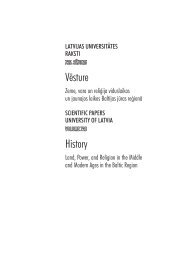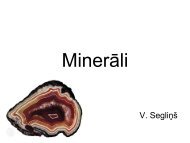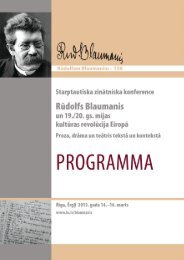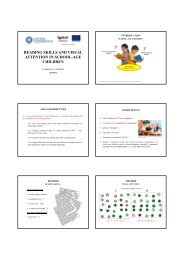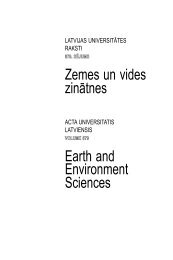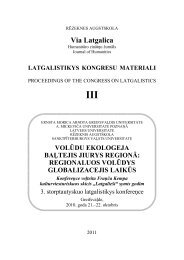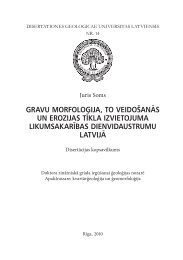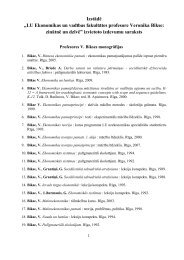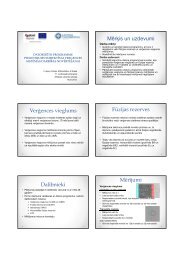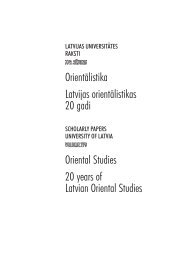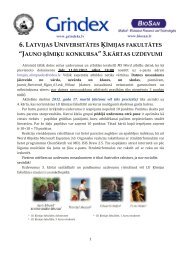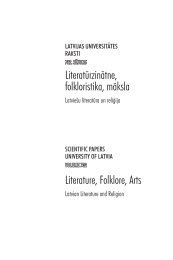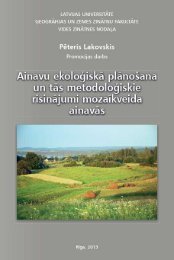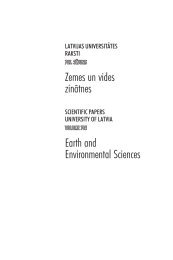Untitled
Untitled
Untitled
Create successful ePaper yourself
Turn your PDF publications into a flip-book with our unique Google optimized e-Paper software.
Sigma Ankrava. Pçckoloniâlais sindroms un identitâtes krîze Latvijâ<br />
up more space in the world as necessary; the balance of positive and negative forces<br />
in nature and in the human soul” 7 . Out of this approach there grows the tradition of<br />
onkeeping one’s environment in order and protecting it. The farmer’s way of life has<br />
created monogamous relationships that encourage consequent partnership and mutual<br />
respect between man and woman in all aspects of life.<br />
The psychology of the cattle–breeders is quite different. For cattle–breeders it is<br />
important to take up and use as much space as possible, and then move on with their<br />
flock. Consequently, much attention is given to the comfort of the dwelling place, whereas<br />
the environment is more or less neglected. Cattle breeders could afford more than one<br />
wife and more children than farmers, because cattle–breeding provides people with food<br />
more solidly than farming. Women were less engaged in cattle breeding than men, and<br />
were accordingly treated as less important members of the society.<br />
Psychologically this demarcation line between the West and the East runs<br />
through Latvia right up to the present day. It can be traced in the present discussion<br />
about the relations between the individual and the state. Some people in this country<br />
believe that there should be a kind of “social contract” between the state and the<br />
people, with clearly defined duties and rights on both sides, whereas other people<br />
are more concerned with their own rights. Actually, there is a debate whethera Latvia<br />
should remain a country of Parliamentary democracy or should become a Presidential<br />
democracy. In the latter case the President would be elected by the people and would<br />
become a powerful executive. Thus in a country without a well–functioning lasting<br />
democratic tradition the President would have the potential of becoming despot. The<br />
fact that this issue has been raised speaks for itself. It may mean 1) that the people of<br />
Latvia do not trust the representatives they have elected to Parliament themselves (a<br />
TV poll quiz after the last elections in October 2002 when the results of the elections<br />
were not yet known showed that only 1:10 of the population believes that the recently<br />
elected MPs are not going to pursue selfish goals in their new post); 2) they<br />
believe that everybody is corrupt and if elected to MP themselves they would pursue<br />
selfish goals. 3) It may mean that under totalitarian/authoritarian regimes people can<br />
turn into a mob and then long for someone to take care of and be responsible for<br />
them.. Ha-ving been deprived of participation in policy making for a long period of<br />
time, they have lost all confidence belief that they could ever affect and shape it.<br />
This is the worst thing that totalitarian /authoritarian regimes do to people, but it is<br />
far from new; the same problem has been depicted by Shakespeare in “Julius Caesar”<br />
and “ Henry VIII” in its full complexity.<br />
The relations between the individual and the state have a lot to do within<br />
the role of the church and its tradition. In the West, historically speaking, in the<br />
course of time the Church has defended the principles of humanity against the interests<br />
of separate states. Later the idea of free choice and individual responsibility<br />
emerged, leading to the formation of the principles of fraternity, equality and liberty.<br />
It is important to note that these principles are arranged exactly in this order, because<br />
that is how they still shape contemporary democracy. Freedom is impossible without<br />
equality.<br />
The Christian Orthodox Church developed along a different lines in Eastern Europe.<br />
There it was shaped and developed in the form of national churches. It created<br />
31



